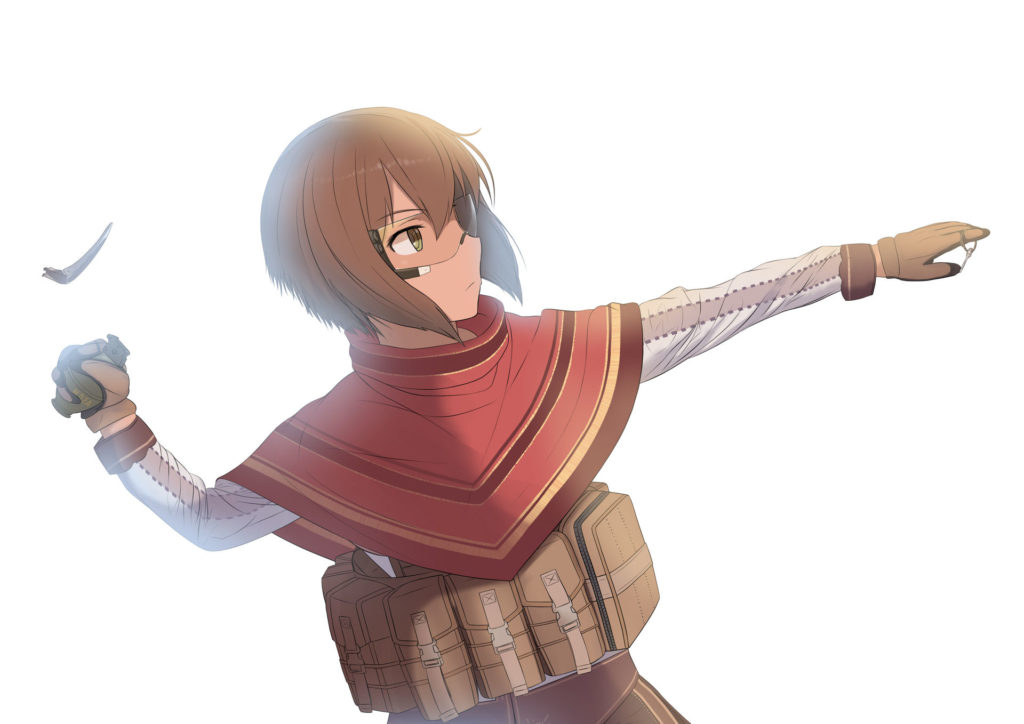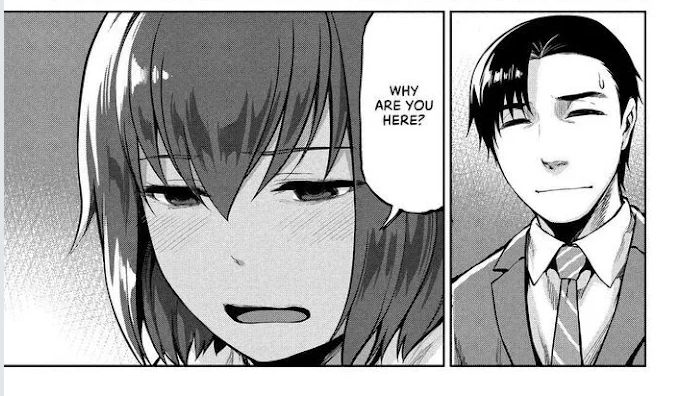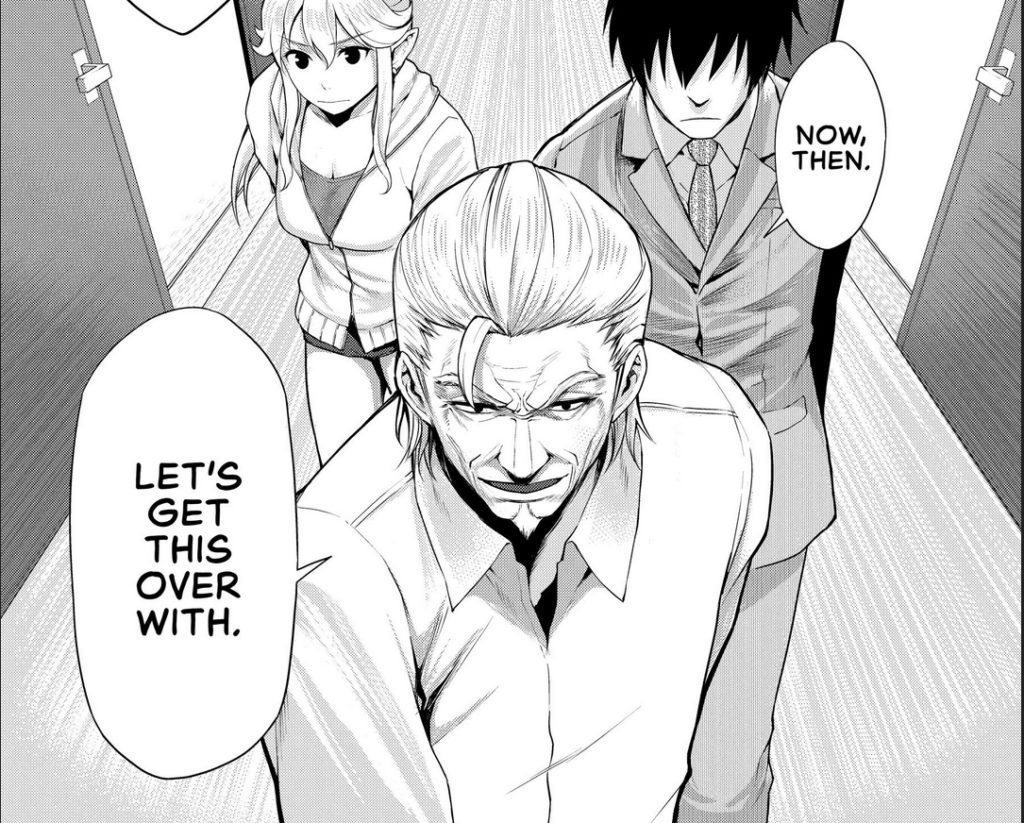Manga: Marginal Operation
November 29, 2022 · 1 comment
By Jeannette Ng.

I flat-out don’t know what to do with Marginal Operation.
The premise is one that I’ve grown familiar with in light novels and manga: a nerdy young man, who has a talent for video games, loses his unfulfilling job and is ominously beckoned towards a whole new world, where his seemingly useless hobbies and habits will somehow grant him mastery. Along the way, cute girls will fancy him and there will be some sort of rival who is his dark mirror. There will be exotic locations and a dash of political intrigue. I know this story. I’ve seen it play out dozens of times and I am fond enough of its escapist formula.
But this time, it’s different. And I just don’t mean this time he’s a spider.
The new place Ryouta Arata finds himself in is not another world, but simply a part of this one so cruel and so utterly divorced from his daily life of safety and ignorance in Japan that it feels like a different one. The glowing advert he stumbles upon on his laptop and calls to him like a siren song is one for a private military security company. His job as an Operator of Operators (aka, an OO) is to look at dots on a map and press buttons.

Perhaps if I had read the blurb more carefully, the actual plot of Marginal Operation wouldn’t have snuck up on me so much. And it’s not like the story doesn’t open with some explosive action in a desert before smash-cutting to modern day Japan. But in my defence, we were also hitting every beat of the isekai backstory and the strange tests administered by mysterious American men in crisp suits was reminding me of the job interview in Men in Black. So even as Arata arrives in Tajikistan and begins his long, confusing training, I am convinced there is going to be a supernatural twist. I mean, he even meets a blonde woman with elf ears. The Japanese interpreter seems to be living a double life. There have to be secrets afoot.
And there are, in fairness, secrets. The company is very much withholding critical information from their new recruits. What exactly it is that he is training to do is at once deeply opaque and frighteningly clear. I am familiar enough with Phillip K Dick’s Time Out of Joint and Orson Scott Card’s Ender’s Game to see that coming. This tactical battle simulator with primitive graphics that the operators aren’t allowed to ever step away from, even for a toilet break, is exactly what you would suspect it to be.

What I wasn’t prepared for is how it would all feel. It is in that my expectations for simple escapism, power fantasy and wish fulfilment collided with the slow realisation that there is going to be only one world and that world is grim, cruel and just grounded enough in reality that it cuts me deep. Each volume ends with the line: “The events recorded in this manga are based off the state of the world in the time it was written.”
Manga as a medium is certainly not limited to pandering nonsense, but Marginal Operation does lean into some of those excesses. It is in that balance of the moé-inspiring flourishes with the sheer horror of modern warfare and a bleak, unvarnished outlook on geopolitics that Marginal Operation thrives.
Recurring throughout the first arcs are the anxieties around the gamification of war, the inherent political nature of conflict and the distance between those who give orders and those who have to actually mete out death. These are themes that games both big and small have tackled over the years, most notably certainly not limited to Yager Development’s Spec Ops: the Line. It’s a talking point that haunts every Call of Duty: Modern Warfare or Battlefield release, that the makers of the game have to swear up and down that despite all the modern war, the thing they’ve made simply isn’t political. Maybe that’s the better lens through which I should read this, not as a counterpoint to action films but as a shadow story to violent, shock-driven video game narratives.

As Arata comes to terms with death-dealing job he has signed up for, he makes the acquaintance of Omar, an adult soldier stuck in charge of a group of child conscripts. He is also taught English by a busty whore he visits at the brothel near the base — the only place he and the soldiers are allowed to visit in their spare time. In this sort of messy, gritty storytelling, violence and sex come hand in hand, and Marginal Operation’s approach is unflinching. Sex and sexual violence are recurring elements, from the brothel without doors – for the protection of the women working there — to what happened to the child soldiers before Omar took over the squad, to Kishimoto’s revenge. For all the nudity, little of it feels particularly titillating.
Whenever cornered into sexual situations, Arata is inevitably oblivious, uncomfortable and barely able to function. The mixture of disgust and discomfort makes the majority of scenes feel disempowering. And there is plenty of skin-crawling horror in the narrative’s prosaic acceptance of rape as this ubiquitous undercurrent among those given far too much power.
In contrast, the child-soldier Jibril’s burgeoning sexuality – despite the deeply, deeply inappropriate Arata as the target of her affection – is almost wholesome. Her fellow soldiers help her try to navigate this confusing world of feelings and their antics feel incongruous in Marginal Operation, as do the periodic flirtations with fan service as Jibril escalates her attempts at more blatant seduction. And I am asking myself if I’ve misunderstood the whole thing, that none of this grim and gruesome tale is meant as intentionally discomforting prognostication about the state of the world but instead is just pandering nonsense. That this is just a power fantasy so alien to me that I mistake it for profound.

But this is still the grimmest depiction of child soldiers in a genre and medium replete with child soldiers, though almost always with the help of magic and giant robots. Warfare acts not as metaphor or power fantasy. This is not Girls und Panzer. It’s not even Evangelion. They’re just kids who have been shoved onto the front lines and we are beginning the story with half of them already dead.
As the volumes march on and the situation escalates ever further, I can feel my own moral compass being eroded like Arata’s. In what could possibly lie the correct choice when living in such a fallen world? He gains the nickname “the Headmaster” among those operating in the world of proxy wars.
And yet the story insistently drags itself back to those other silly genre accoutrements. The story drags itself back to Japan and flirts with those familiar otaku indulgences. There is also a never-ending supply of mysterious femme fatales with inscrutable motivations. I want to say that it’s intentional, that it is thematically important, for the story is about that unmasking of the reader’s (assumed) peaceful mundanity, that out there, the horrors of war are happening, regardless of whether or not you choose to pay attention. Whether or not you choose to do anything about it. I want to say that these genre flourishes are there for contrast, showing you that bad things happen not just in grim and gritty films with names like The Hurt Locker, but that they happen here and now and alongside your fun escapist nonsense.
For the most part, the art is serviceable and the character design is as you’d expect. Our suit-wearing protagonist with his mop of black hair is deeply nondescript and the same can be said of his friend and companion, Kishimoto. The children are wide-eyed and softly drawn, the women are breasty and all the various weathered old men, foreign soldiers, disgusting dignitaries and brothel-operating crones are creased in dense, knobbly linework. The vast majority of the pages are taken up with straightforward, cleanly depicted conversations. But it is in the horrors of war that the art comes alive. Uncluttered exchanges of dialogue give way to chaos. Arata confronting the consequences of his actions – realising that there is a human life behind each of those deleted E icons – is particularly memorable.
I don’t know how to recommend Marginal Operation, or even if I actually do recommend it. Maybe I was always the wrong person to review this because I don’t have the right cultural touchstones. But I did read almost ten volumes of it in a single sleepless night and it was compelling, captivating read. Make of that what you will.
Jeannette Ng is the author of Under the Pendulum Sun. Marginal Operation is released by Denpa and available in the UK from Anime Limited.
Dingus
January 19, 2023 4:35 am
It was a good read up until they forced the love interest into being a little girl... God damn it Japan. The rest is an interesting dive into Arata's experience with war in general. Has plenty of grit overall with some events not being for those with a weak stomach, because even I wanted to stop after reaching a certain point. I want to say around ch.60 and beyond is when it starts to frantically shut down the story as a whole to just conclude that this will be Arata's lifestyle until the day he dies; to give the kids of war a future without violence.